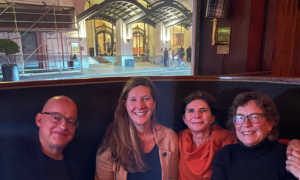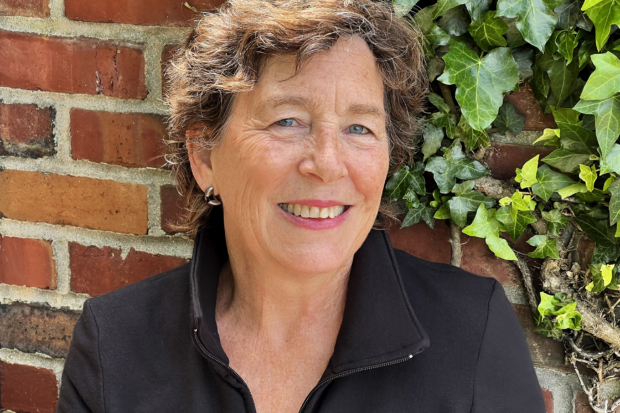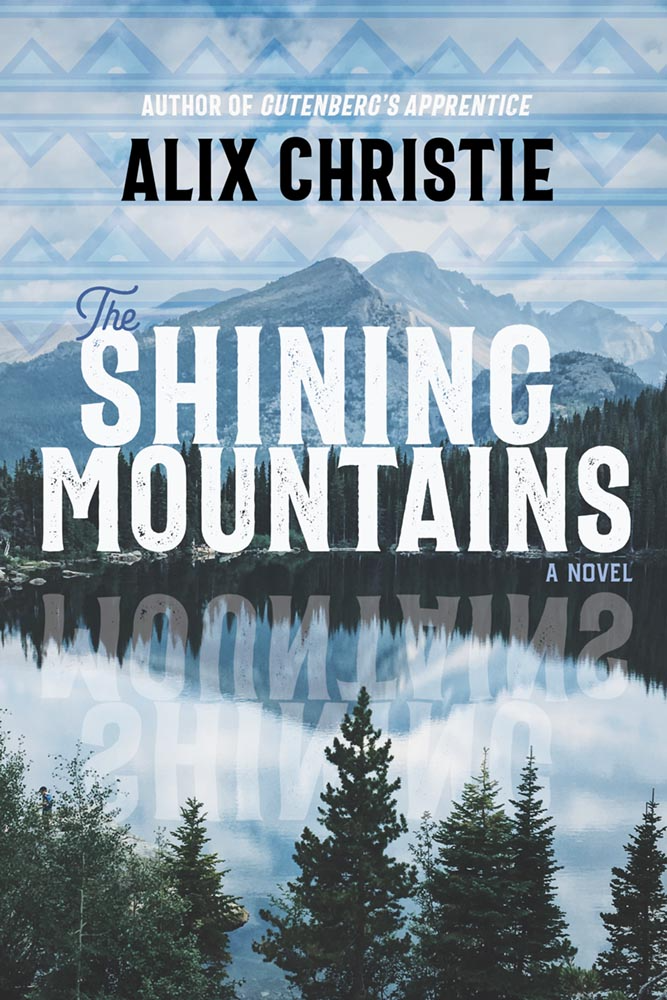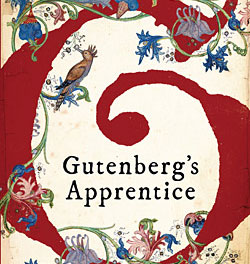
We recently had the opportunity to reconnect with author Alix Christie and her husband, Ludwig Siegele at the historic House of Shields bar (open since 1908) in downtown San Francisco, California. A longtime SabbaticalHomes.com member, Alix and her family have traveled throughout the world and lived in many different countries.
We originally interviewed Alix in 2015 when she published her debut novel, Gutenberg’s Apprentice, an acclaimed historical fiction about the invention of printing and the making of the Gutenberg Bible (see our original interview below).
Her upcoming novel, The Shining Mountains, is based on the true story of her Scottish ancestor’s family in the fur trade in the 19th century American Northwest at a time of great conflict and change.
The Shining Mountains by Alix Christie: A Behind the Scenes Conversation
We followed up our lovely meeting in San Francisco with some questions about Alix Christie’s new novel.
The Shining Mountains: A Writer’s Inspiration
SabbaticalHomes.com (SH): Your previous novel, Gutenberg’s Apprentice, was inspired by your fascination with the revolution of printing and your experiences using printing presses yourself.
For The Shining Mountains, had you heard family lore about this story all your life? What inspired you to write your latest book?
Alix Christie (AC): We knew growing up that some of our ancestors were fur traders for the Hudson’s Bay Company and had married into Native American tribes. Though my branch of the family is Scottish, not Native American, I was fascinated and made my first family tree at age 14.
A few years ago, my brother, a professor of English and an historian, wrote a scholarly article about Duncan McDonald, the son of our ancestor’s brother Angus and his Nez Perce wife Catherine Baptiste. Duncan was the first Native person to write about the conflicts between settlers and indigenous people in a newspaper (in Montana in 1878). I was intrigued by his story and found his parents’ story even more amazing and knew that I wanted to share it as a novel.
SH: How much historical information were you able to find about your relative Angus McDonald, or his wife Catherine Baptiste? And would you describe your sources for that (genealogy, records, input from relatives)?
AC: Angus and Duncan were both prominent in their day, so there are letters and journals in the archives. Catherine, like most women, left little written trace, except for a brilliant account of one of her trapping trips she shared with Angus. I was fortunate that a Scottish historian had written an entire book on this family, and I tracked down all of his research to confirm it.
As a journalist as well as a novelist, I try very hard to base my fiction on verifiable facts. I was extremely lucky that my distant cousins —the McDonalds’ direct descendants on the Flathead Indian Reservation in Montana—supported this project wholeheartedly. We shared family information and I consulted with elders in the tribes concerned to ensure my depiction of Catherine’s world was as accurate as possible.
SH: How much of the book is biography versus fiction?
AC: I would say that my method is to take situations that really happened, and try to imagine who the people concerned might have been, and why they might have acted the way they did. (This is how I approached Gutenberg’s Apprentice, too.)
All of the McDonalds’ biographical information is true, including where they lived and worked and their many children. Given that they were a mixed-race family caught in the crossfire of westward colonial expansion, I imagined how they felt—except for Duncan, who was quite explicit about his feelings in published accounts and personal letters.
The Shining Mountains: Historical & Social Context
SH: Since this book is set in the 19th century with a central theme of the impact of Manifest Destiny, you walked the line as an author of storytelling versus respecting how brutal this time in history was for Native Americans. How were you able to work with the Nez Perce and the Confederated Salish and Kootenai Tribes to receive official support for your book?
AC: Part of my goal in telling this story was to help readers viscerally understand how brutal this time was in our country. It was absolutely essential that I work in consultation with the living descendants of the tribes I write about in the book.
I approached both tribes formally and received approval from their cultural committees to undertake the project, and then the manuscript was read and approved by an elder in each tribe. At the same time, I shared the manuscript with historians and direct descendants in Montana to ensure I got things right.
SH: Without giving anything away, were there parts of this book that were easier or more difficult for you to write?
AC: The most uplifting part for me was really admiring this tenacious couple and wanting to describe the great love they shared that carried them through this difficult period. They actually got married four times!
It helped a lot to stay close to them as people as they dealt with what were otherwise very violent and painful experiences. And even though parts were hard to write, I am convinced that we need to look squarely at this bloody history in order to acknowledge the pain Native Americans still live with.
Learning about their history and lives, and getting to know my distant relatives, has been personally very rewarding.
SH: Where did you come up with the name, The Shining Mountains, and which mountains does it refer to?
AC: This is a name that was used by early settlers and perhaps some tribes to describe the Rocky Mountains. It was also the name of a pageant that was put on in the 1950s on the Flathead Reservation to share the region’s colorful history.
SH: Most importantly, where can we buy this latest book from one of our favorite authors?
AC: It’s out now at all bookstores, brick and mortar and online, in the United States and Canada, with hopes for a British edition soon.
Related: Purchase The Shining Mountains
Author Alix Christie: What’s your Current Dream Destination?
SH: One more follow up question, when we last profiled you, we asked if you had a dream sabbatical/travel destination. Your answer then was Buenos Aires. Have you made it there yet? Or do you have a new dream destination?
AC: We haven’t made it to Buenos Aires yet! We fully intended to go to South America when we relocated to California—but then there was this worldwide pandemic. Now we’re heading east again to Berlin — so I’m thinking it’s time to visit Kyoto and Naoshima, Japan’s art island.
Related: SabbaticalHomes.com Home Listings in Japan
Gutenberg’s Apprentice by Author Alix Christie: Her Debut Novel
We also had the pleasure of interviewing Alix Christie in 2015 when she published her debut novel, Gutenberg’s Apprentice. The world of type has captivated the printer, journalist, and writer since the age of 16.
Making her way from coastal California to London, via Germany, the author of the acclaimed debut novel is indeed well-traveled.
A SabbaticalHomes member since 2008, we were excited to learn about Christie’s recent accomplishment! We had the opportunity to ask her about her writing process, travels around the globe, and friends she’s made renting out her Berlin apartment to fellow writers and scholars using SabbaticalHomes.com.
Alix Christie: Author and Letterpress Printer
SabbaticalHomes.com: You have an interesting, personal relationship to the print process, especially as an author. Can you give us a brief background of how you became involved with the subject of your book?
Alix Christie: I’ve been a letterpress printer on and off since my teens – mostly off, because I’ve lived abroad for so many years and platen presses literally weigh tons. My grandfather was a type founder in San Francisco; I learned what it was to be an apprentice from him and another fine printer in California.
Still, I never expected to write a book about the invention of printing. I had finished an MFA in creative writing and written one unpublished novel when an article in the New York Times caught my eye. It reported on new research into how Gutenberg might have made his first types.
That was in 2001 – it took me some time, and a move to Berlin, Germany, but that story was the spark that sent me on a seven-year journey to tell the story of the world’s most famous book.
SH: How do you feel the theme of teetering between old and new technology translates to today’s generation of readers?
AC: I only started thinking about this once I started writing and began to really understand how the printing press would have shocked and amazed people living in the late middle ages. It seemed to me very clear that we were living through as fundamental a shift – that’s why I call the invention of printing the last great media revolution before our own.
If there is one thing I hope readers take away from the novel, it’s a sense that the new thing doesn’t have to completely destroy the old. New technologies are simply tools, even if they do have the potential to completely change human nature. It’s up to us to weigh their benefits and costs, and use them accordingly.
“It’s vital, for example, that we humans preserve our sense of wonder and beauty at the natural world and one another, in the face of such addictive new toys as the Internet and social media.”
Author Alix Christie
SH: What question do you wish someone would ask about your experience as an author or about your book, but no one yet has?
AC: I wish someone had asked me why it took so long! Seven years is a long time – in fact it’s the length of time of an apprenticeship in a medieval guild.
Answering it would give me the opportunity to say how important it is for writers—who are parents and working people, like most of us–to have the support at home they need to go off into this other world. In my case my husband and I built a great partnership to raise our kids in three different countries while I wrote and he held a full-time job. The other piece is that we lived in the U.S., Germany and England, with two international moves, while I was researching and writing this book.
What I have learned is that creative projects work at their own rhythms, like all of us, and what might seem like a delay could in fact be enriching the end product. I couldn’t have written the book without the training in the U.S., the source material in Germany, and the wealth of experts and beautiful books in London, where I live.
A Writer’s Experience as a SabbaticalHomes.com Host
SH: Can you share some stories about the people you’ve met through SabbaticalHomes.com?
AC: We’ve met the most incredible people through SabbaticalHomes.com. Our apartment in Berlin was a true sabbatical home to a succession of academics from Australia, Canada, Germany who spent a year there.
One of the best things was providing clever guests at dinner parties for our neighbors in the building. A particular favorite was the philosopher and his teacher wife from Princeton! In London we’ve let our flat for short breaks and our most recent visitor was a lovely woman from Belgium who spoiled our cat much more than we do with toys and grooming equipment! I feel quite confident that I could turn up in any of their countries and spend a very enjoyable evening with any of them.
SH: What’s the most challenging thing about renting your home? And how do you overcome it?
For me the toughest part is tidying away clutter and making the place feel less like someone’s personal space and more like a vacation apartment. It’s a small flat and I sometimes hide things so well that I can’t find them again afterwards!
On the plus side, clearing stuff away does inspire me to get rid of unnecessary junk, which is all to the good when you live in a small urban apartment.
Related: Preparing your Home for a Stay
Author Alix Christie: Dream Destination?
SH: Do you have a dream sabbatical/travel destination?
AC: I would love to spend a few months in Buenos Aires. We’ve still got one child to get through high school, but in a couple of years I predict we’ll be ready to do some serious swapping!
Related: Search Home Exchanges all over the World
Let us know what you think! Connect with us on Twitter, LinkedIn, Facebook, Instagram, YouTube and Pinterest.




